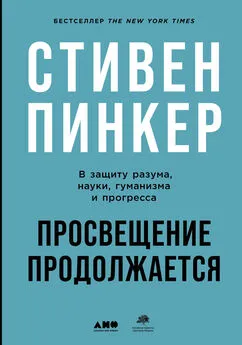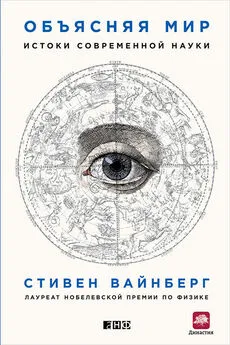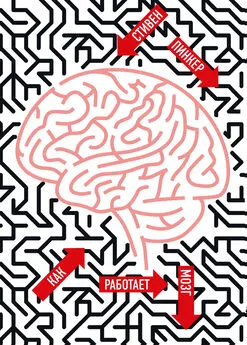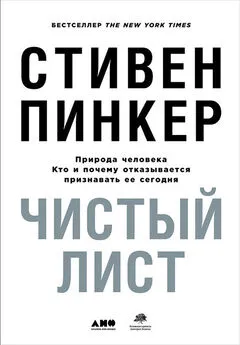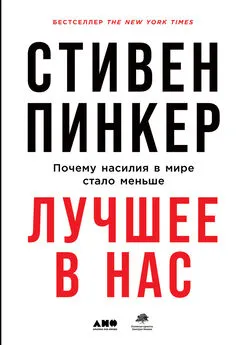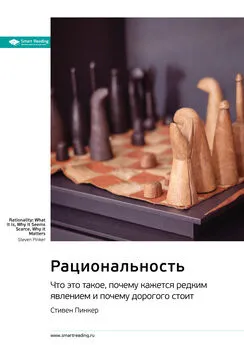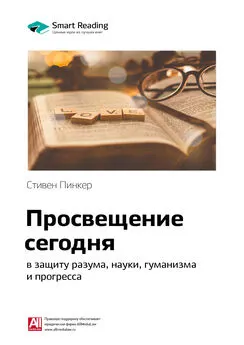Стивен Пинкер - Просвещение продолжается. В защиту разума, науки, гуманизма и прогресса
- Название:Просвещение продолжается. В защиту разума, науки, гуманизма и прогресса
- Автор:
- Жанр:
- Издательство:Альпина нон-фикшн
- Год:2021
- Город:Москва
- ISBN:9785001395362
- Рейтинг:
- Избранное:Добавить в избранное
-
Отзывы:
-
Ваша оценка:
Стивен Пинкер - Просвещение продолжается. В защиту разума, науки, гуманизма и прогресса краткое содержание
Этот прогресс – не случайность и не результат действия внешних сил. Это дар современному миру от деятелей Просвещения, которые первыми додумались, что знания можно использовать во имя процветания всего человечества. Идеи Просвещения – вовсе не наивные мечтания. Наоборот, они сработали – и это неоспоримый факт. Тем не менее именно сейчас эти идеи особенно нуждаются в нашей защите, поскольку противостоят характерным недостаткам человеческой природы – трайбализму, авторитаризму, демонизации чужаков и магическому мышлению, – которые так нравится эксплуатировать современным демагогам. Да, стоящие перед человечеством проблемы огромны, но все они решаемы, если мы, продолжая дело Просвещения, используем для этого разум, доверяем науке и руководствуемся идеалами гуманизма.
Особенности
Более 70 графиков из почти всех областей человеческой жизни.
Для кого
Для поклонников Стивена Пинкера. Для всех, кто интересуется природой человека. Для тех, кто верит в прогресс, и для тех, кто в нем сомневается.
Просвещение продолжается. В защиту разума, науки, гуманизма и прогресса - читать онлайн бесплатно ознакомительный отрывок
Интервал:
Закладка:
Hayek, F. A. 1945. The use of knowledge in society. American Economic Review, 35, 519–30.
Hayek, F. A. 1960/2011. The constitution of liberty: The definitive edition . Chicago: University of Chicago Press.
Hayflick, L. 2000. The future of aging. Nature, 408, 267–69.
Hedegaard, H., Chen, L.-H., & Warner, M. 2015. Drug oisoning deaths involving heroin: United States, 2000–2013. NCHS Data Brief, 190 .
Hegre, H. 2014. Democracy and armed conflict. Journal of Peace Research, 51, 159–72.
Hegre, H., Karlsen, J., Nygård, H. M., Strand, H., & Urdal, H. 2011. Predicting armed conflict, 2012–2050. International Studies Quarterly, 57, 250–70.
Hellier, C. 2011. Nazi racial ideology was religious, creationist and opposed to Darwinism. Coelsblog: Defending scientism . https://coelsblog.wordpress.com/2011/11/08/nazi-racial-ideology-was-religious-creationist-and-opposed-to-darwinism/#sec4.
Helliwell, J. F., Layard, R., & Sachs, J., eds. 2016. World Happiness Report 2016 . New York: Sustainable Development Solutions Network.
Henao-Restrepo, A. M., Camacho, A., Longini, I. M., Watson, C. H., Edmunds, W. J., et al. 2017. Efficacy and effectiveness of an rVSV ectored vaccine in preventing Ebola virus disease: Final results from the Guinea ring vaccination, open abel, cluster andomised trial. The Lancet, 389, 505–18.
Henry, M., Shivji, A., de Sousa, T., & Cohen, R. 2015. The 2015 annual homeless assessment report to Congress . Washington: US Department of Housing and Urban Development.
Herman, A. 1997. The idea of decline in Western history . New York: Free Press.
Heschel, S. 2008. The Aryan Jesus: Christian theologians and the Bible in Nazi Germany . Princeton, NJ: Princeton University Press.
Hidaka, B. H. 2012. Depression as a disease of modernity: Explanations for increasing prevalence. Journal of Affective Disorders, 140, 205–14.
Hidalgo, C. A. 2015. Why information grows: The evolution of order, from atoms to economies . New York: Basic Books.
Hirschl, T. A., & Rank, M. R. 2015. The life course dynamics of affluence. PLOS ONE, 10 (1): e0116370/. Hirschman, A. O. 1971. A bias for hope: Essays on development and Latin America . New Haven: Yale University Press.
Hirschman, A. O. 1991. The rhetoric of reaction: Perversity, futility, jeopardy . Cambridge, MA: Harvard University Press.
Hirsi Ali, A. 2015a. Heretic: Why Islam needs a reformation now . New York: HarperCollins.
Hirsi Ali, A. 2015b. Islam is a religion of violence. Foreign Policy, Nov. 9.
Hoffmann, M., Hilton-Taylor, C., Angulo, A., Böhm, M., Brooks, T. M., et al. 2010. The impact of con-servation on the status of the world’s vertebrates. Science, 330, 1503–9.
Hollander, P. 1981/2014. Political pilgrims: Western intellectuals in search of the good society . New Brunswick, NJ: Transaction.
Horkheimer, M., & Adorno, T. W. 1947/2007. Dialectic of Enlightenment . Stanford: Stanford University Press.
Horwitz, A. V., & Wakefield, J. C. 2007. The loss of sadness: How psychiatry transformed normal sorrow into depressive disorder . New York: Oxford University Press.
Horwitz, S. 2015. Inequality, mobility, and being poor in America. Social Philosophy and Policy, 31, 70–91.
Housel, M. 2013. Everything is amazing and nobody is happy. The Motley Fool . http://www.fool.com/investing/general/2013/11/29/everything-is-great-and-nobody-is-happy.aspx.
Hout, M., & Fischer, C. S. 2014. Explaining why more Americans have no religious preference: Political backlash and generational succession, 1987–2012. Sociological Science, 1, 423–47.
Howard, M. 2001. The invention of peace and the reinvention of war . London: Profile Books.
Howson, C., & Urbach, P. 1989/2006. Scientific reasoning: The Bayesian approach (3rd ed.). Chicago: Open Court Publishing.
Hu, G., & Baker, S. P. 2012. An explanation for the recent increase in the fall death rate among older Americans: A subgroup analysis. Public Health Reports, 127, 275–81.
Hu, G., & Mamady, K. 2014. Impact of changes in specificity of data recording on cause pecific injury mortality in the United States, 1999–2010. BMC Public Health, 14, 1010.
Huberman, M., & Minns, C. 2007. The times they are not changin’: Days and hours of work in old and new worlds, 1870–2000. Explorations in Economic History, 44, 538–67.
Huff, T. E. 1993. The rise of early modern science: Islam, China, and the West . New York: Cambridge University Press.
Hultman, L., Kathman, J., & Shannong, M. 2013. United Nations peacekeeping and civilian protection in civil war. American Journal of Political Science, 57, 875–91.
Human Security Centre. 2005. Human Security Report 2005: War and peace in the 21st century . New York: Oxford University Press.
Human Security Report Project. 2007. Human Security Brief 2007 . Vancouver, BC: Human Security Report Project.
Human Security Report Project. 2009. Human Security Report 2009: The shrinking costs of war . New York: Oxford University Press.
Human Security Report Project. 2011. Human Security Report 2009/2010: The causes of peace and the shrinking costs of war. New York: Oxford University Press.
Humphrys, M. (Undated.) The left’s historical support for tyranny and terrorism. http://markhumphrys.com/left.tyranny.html.
Hunt, L. 2007. Inventing human rights: A history . New York: Norton.
Huntington, S. P. 1991. The third wave: Democratization in the late twentieth century . Norman: University of Oklahoma Press.
Hyman, D. A. 2007. The pathologies of institutional review boards. Regulation, 30, 42–49.
Inglehart, R. 1997. Modernization and postmodernization: Cultural, economic, and political change in 43 societies . Princeton, NJ: Princeton University Press.
Inglehart, R. 2016. How much should we worry? Journal of Democracy, 27, 18–23.
Inglehart, R. 2017. Changing values in the Islamic world and the West. In M. Moaddel & M. J. Gelfand, eds., Values, political action, and change in the Middle East and the Arab Spring . New York: Oxford University Press.
Inglehart, R., Foa, R., Peterson, C., & Welzel, C. 2008. Development, freedom, and rising happiness: A global perspective (1981–2007). Perspectives in Psychological Science, 3, 264–85.
Inglehart, R., & Norris, P. 2016. Trump, Brexit, and the rise of populism: Economic have ots and cultural backlash. Paper presented at the Annual Meeting of the American Political Science Association, Philadelphia.
Inglehart, R., & Welzel, C. 2005. Modernization, cultural change and democracy . New York: Cambridge University Press.
Institute for Economics and Peace. 2016. Global Terrorism Index 2016 . New York: Institute for Economics and Peace.
Instituto Nacional de Estadística y Geografía. 2016. Registros administrativos: Mortalidad. http://www.inegi.org.mx/est/contenidos/proyectos/registros/vitales/mortalidad/default.aspx.
Insurance Institute for Highway Safety. 2016. General statistics. http://www.iihs.org/iihs/topics/t/general-statistics/fatalityfacts/overview-of-fatality-facts.
Intergovernmental Panel on Climate Change. 2014. Climate change 2014: Synthesis report. Contribution of working groups I, II and III to the fifth assessment report of the Intergovernmental Panel on Climate Change . Geneva: IPCC.
International Humanist and Ethical Union. 2002. The Amsterdam Declaration. http://iheu.org/humanism/the-amsterdam-declaration/.
International Labour Organization. 2013. Marking progress against child labour: Global estimates and trends, 2000–2012 . Geneva: International Labour Organization.
Ipsos. 2016. The perils of perception 2016. https://perils.ipsos.com/.
Irwin, D. A. 2016. The truth about trade. Foreign Affairs, June 13.
Israel, J. I. 2001. Radical enlightenment: Philosophy and the making of modernity, 1650–1750 . New York: Oxford University Press.
Jackson, J. 2016. Publishing the positive: Exploring the perceived motivations for and the consequences of reading solutions ocused journalism. https://www.constructivejournalism.org/2016/11/21/qa-with-positive-news-researcher-jodie-jackson/.
Jacobs, A. 2011. Introduction. In W. H. Auden, The age of anxiety: A Baroque eclogue . Princeton, NJ: Princeton University Press.
Jacobson, J. Z., & Delucchi, M. A. 2011. Providing all global energy with wind, water, and solar power. Energy Policy, 39, 1154–69.
Jacoby, S. 2005. Freethinkers: A history of American secularism . New York: Henry Holt.
Jamison, D. T., Summers, L. H., Alleyne, G., Arrow, K. J., Berkley, S., et al. 2015. Global health 2035: A world converging within a generation. The Lancet, 382, 1898–1955.
Jefferson, T. 1785/1955. Notes on the state of Virginia . Chapel Hill: University of North Carolina Press. Jensen, R. 2007. The digital provide: Information (technology), market performance, and welfare in the South Indian fisheries sector. Quarterly Journal of Economics, 122, 879–924.
Jervis, R. 2011. Force in our times. International Relations, 25, 403–25.
Johnson, D. D. P. 2004. Overconfidence and war: The havoc and glory of positive illusions . Cambridge, MA: Harvard University Press.
Johnson, E. M. 2010. Deconstructing social Darwinism: Parts I–IV. The Primate Diaries . http://scienceblogs.com/primatediaries/2010/01/05/deconstructing-social-darwinis/.
Johnson, N. F., Spagat, M., Restrepo, J. A., Becerra, O., Bohorquez, J. C., et al. 2006. Universal patterns underlying ongoing wars and terrorism. arXiv.org . http://arxiv.org/abs/physics/0605035.
Johnston, W. M., & Davey, G. C. L. 1997. The psychological impact of negative TV news bulletins: The catastrophizing of personal worries. British Journal of Psychology, 88 .
Jones, R. P., Cox, D., Cooper, B., & Lienesch, R. 2016a. The divide over America’s future: 1950 or 2050? Findings from the 2016 American Values Survey . Washington: Public Religion Research Institute.
Jones, R. P., Cox, D., Cooper, B., & Lienesch, R. 2016b. Exodus: Why Americans are leaving religion – and why they’re unlikely to come back . Washington: Public Religion Research Institute.
Jones, R. P., Cox, D., & Navarro ivera, J. 2014. Believers, sympathizers, and skeptics: Why Americans are conflicted about climate change, environmental policy, and science . Washington: Public Religion Research Institute.
Jussim, L., Krosnick, J., Vazire, S., Stevens, S., Anglin, S., et al. 2017. Political bias. Best Practices in Science . https://bps.stanford.edu/?pageid=3371.
Kahan, D. M. 2012. Cognitive bias and the constitution of the liberal republic of science. Yale Law School, Public Law Working Paper 270. https://papers.ssrn.com/sol3/papers.cfm?abstractid=2174032.
Kahan, D. M. 2015. Climate-science communication and the measurement problem. Political Psychology , 36, 1–43.
Kahan, D. M., Braman, D., Slovic, P., Gastil, J., & Cohen, G. 2009. Cultural cognition of the risks and benefits of nanotechnology. Nature Nanotechnology , 4, 87–90.
Kahan, D. M., Jenkins-Smith, H., & Braman, D. 2011. Cultural cognition of scientific consensus. Journal of Risk Research , 14, 147–74.
Читать дальшеИнтервал:
Закладка:
